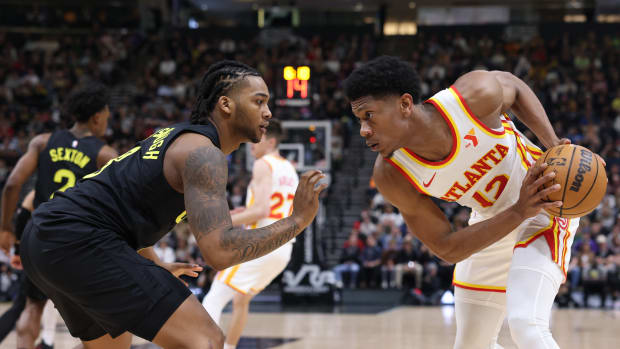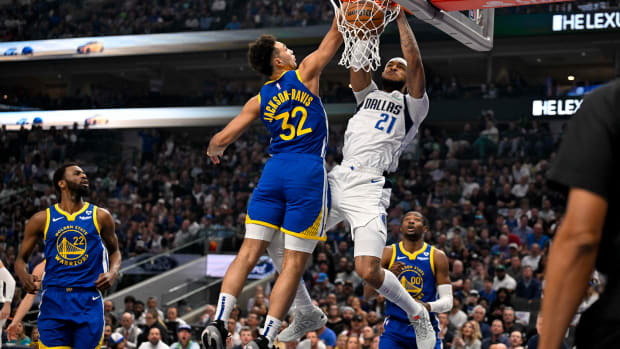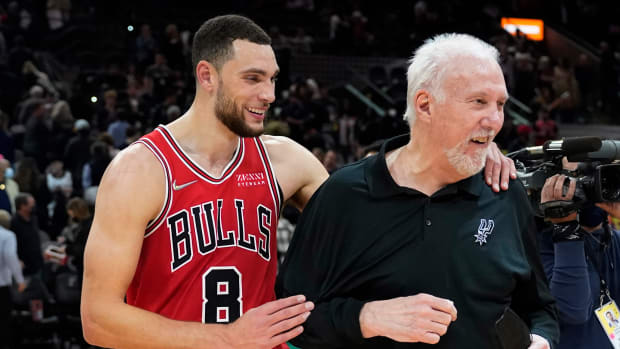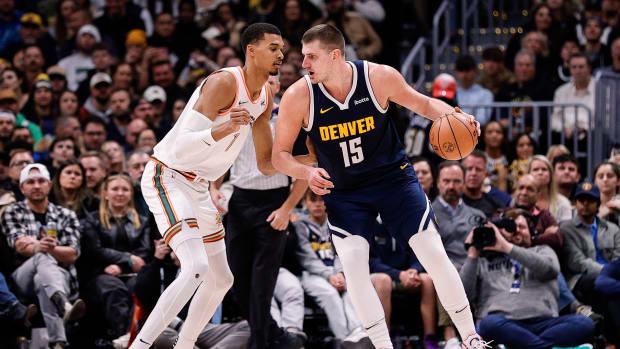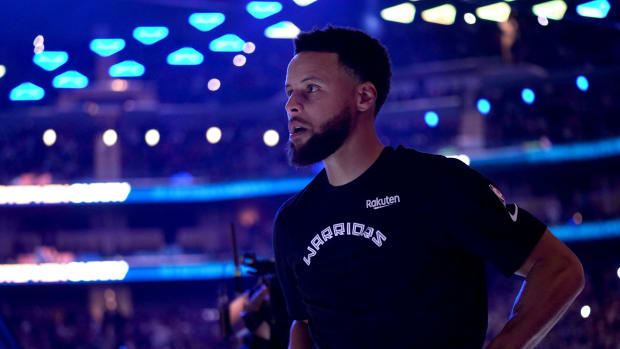NBA Trade Grades: Bucks Take Step Toward Title Contention With George Hill Acquisition
On Thursday, Giannis Antetokounmpo turned 24 years old. On Friday, the Bucks turned both eyes toward title contention. Urgency is the only way to interpret Milwaukee’s aggressive deal with the division rival Cavaliers, which brings the Bucks veteran guard George Hill and future financial flexibility, at the expense of draft picks. Small-market franchises in particular are well aware that their window to appease transcendent talent is ever-fleeting. Cleveland once learned this the hard way, and Milwaukee entered Friday in second place in the Eastern Conference, working to instill belief (and a healthy amount of talent) around its rising superstar with his 2021 free agency beginning to crest on the horizon.
You have reached your limit of 4 premium articles
Register your email to get 1 more
The Bucks sent John Henson, Matthew Dellavedova, a future first and a future second to the Cavaliers in exchange for Hill and Sam Dekker. Milwaukee then sent Dekker to the Wizards for Jason Smith, with Washington gaining a future second-round pick swap. No trade can be truly surmised until well after the fact, but we’ll grade the deal based on immediate principle.
Milwaukee: A-
This decision makes sense on multiple levels for the Bucks, who with the acquisition of Hill upgraded their backcourt and also freed up money going into the 2019 offseason. Hill’s contract, which he initially signed with the Kings two summers ago, includes a minuscule guarantee of just $1 million for the 2019-20 season, provided he is waived by July 2. Dellavedova and Henson, two role players on the fringes of Milwaukee’s rotation, together are owed nearly $20 million next season. The math here is simple. Immediately flipping Dekker for Smith’s $5.5 million expiring contract creates more space, as well, meaning the Bucks could have more than $25 million in additional room. With Khris Middleton likely to decline his player option this summer, Eric Bledsoe coming off the books, Malcolm Brogdon a restricted free agent and a variety of talented free agents on the market, each extra dollar counts for the Bucks, as they enter a pivotal window to upgrade a potential contending roster.
It’s also worth noting that since the deal was executed before 6 p.m. Friday, each of the players in it will be eligible to be dealt on the Feb. 7 trade deadline, granting both teams maximum in-season flexibility. This especially matters in the case of Hill, whose base salary for this season is $19 million. That figure coupled with the partial guarantee (an extremely attractive factor for any team, given it equates to summer cap space) makes him a major salary-matching trade chip should the Bucks come across the right trade to acquire another star player midseason. That’s not to say it will happen, but it’s a significant bonus in terms of potential opportunity for them as the next two months unfold. If they keep Hill and waive him this summer, they’ll have the extra cash and two extra roster spots to fill, as opposed to not at all. His shooting and know-how will fit in nicely with Milwaukee’s other guards, including Bledsoe and Brogdon, as they attempt to win the East with Antetokounmpo driving the team.
MAHONEY: There's Never Been a Strech Four Like Blake Griffin
To understand the value of the Bucks’ newly traded draft pick, recall that Milwaukee owes Phoenix their first-rounder in 2019, protected for selections 1–7 and 17–30 after last season’s Bledsoe trade. Based on the current standings, it’s more likely that pick conveys in 2020 (when it’s protected for only selections 1–7), and if not, 2021. Due to the NBA’s Stepien rule, which prevents teams from dealing consecutive years’ first-round picks in advance, the Bucks can only send this pick to the Cavs two seasons after they send one to the Suns. According to ESPN’s Zach Lowe, the Bucks’ first-rounder going to Cleveland is a lottery-protected 2021 selection, which due to the present situation is most likely to convey in 2022, when it is protected for picks 1–10. After that, it’s protected 1–10 and 25–30 in 2023 and 1–8 in 2024, then converts to two second-rounders if not conveyed by 2025, but the odds are we won’t get that far.
Given the widely-held belief that the NBA will eventually remove the age limit and allow high school seniors to directly enter the draft, it’s possible that this pick could be of major use to the Cavaliers in one of those future drafts, although it’s early to say. Regardless, if the Bucks are able to use Hill and cap space to accelerate their roster growth and make a trip to the Finals in the next couple of seasons, sacrificing the selection may well be worth it. And if it facilitates Antetokounmpo’s long-term happiness and willingness to stick around, well that’s really all that matters.
Cleveland: B+
Credit the Cavs, who understandably are tanking in this post-LeBron present, for utilizing the value in Hill’s contract and striking today, when the added element of his new team being able to deal him again at the trade deadline helped create a market. Cleveland will not be in terrific financial straits next season, and inherits two useful but unspectacular players in Dellavedova (who makes his triumphant return) and Henson (who is out indefinitely after wrist surgery) that will soak up minutes as the team races to the bottom of the standings and angles for a top draft pick in June.
In exchange for Hill, whose equivalent cap space was of little use to a franchise that will have a hard time attracting free agent talent in June regardless, landing a future first-rounder, is still a positive return. That the pick could convey in a window where the potential rule change could make two draft classes worth of prospects available at once helps somewhat, even if the pick protections are not wildly favorable. We can’t know for sure if the Cavs had a more attractive package on the table, but the thinking there was sound, and is sweetened in some capacity by the additional 2021 second-rounder.
NADKARNI: The Houston Rockets Are the Saddest Story of the NBA Season
The Cavs are still in an awkward phase of roster reconstruction after this deal, with 30-year-old Kevin Love owed an unseemly amount of money through 2023, and Tristan Thompson and Jordan Clarkson soaking up nearly $32 million on the books for next season, plus the combined salaries of Dellavedova and Henson. They’re also still figuring out what to do with J.R. Smith, who is not with the team and is owed $15.6 million next season. They are right to take on bad contracts for draft picks, but are going to have to move some more things around in order to do that, now that their biggest trade chip is off the table. They have now added four future picks in the last 10 days, after sending Kyle Korver to Utah, which isn't nothing. Keeping the long view in mind is the best line of thinking here, and Cleveland is sticking to it.
Washington: A-
The gains from this deal are in essence, purely financial for the Wizards—they save nearly $5 million on their luxury tax payments by swapping in Dekker’s lesser expiring salary for Smith’s, and also create a small trade exception in the process. The Wiz will get the Cavs’ 2021 second and send their own 2022 second, according to ESPN’s Brian Windhorst. At this point, every dollar saved counts for the Wizards, who are attempting to right their ship, but have to think realistically based on their poor start. We’ll see if a larger move involving one of their better players follows, as has been speculated for weeks.






























